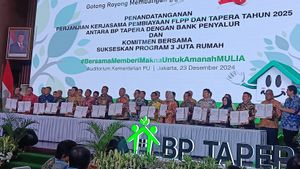JAKARTA - The Minister of Home Affairs (Mendagri) of the Republic of Indonesia Tito Karnavian believes that the fiscal incentives provided by the Ministry of Finance (Kemenkeu) to outstanding regions will contribute to improving regional performance.
"Inflation fiscal incentives, incentives for the use of domestic products, incentives for accelerating regional spending, to village fiscal incentives will definitely have a major effect, because that amount of money means a lot to them (regions)," Tito said during the Fiscal Decentralization International Seminar activity in Jakarta as reported by ANTARA, Tuesday, October 3.
Tito assessed that the fiscal incentives encourage fiscal decentralization policies to the regions, as is the government's mission through the Central and Regional Financial Harmonization Law (UU HKPD).
The Minister of Home Affairs emphasized the importance of fiscal decentralization, where the central government continues to seek the right decentralization format to apply to the state. Tito emphasized the importance of formulating authority related to division of tasks to the regions.
In that context, the government continues to develop the HKPD Law so that it can adapt to various changes, including the environment, social, political, and economic.
"We are looking for a format, the HKPD Law has been born, but we continue to try and try to adapt," said Tito.
اقرأ أيضا:
It is known, the Ministry of Finance provides fiscal incentives worth IDR 1.833 trillion to outstanding local governments. A total of IDR 750 billion was given to 7 provinces, 21 cities, and 97 districts that succeeded in accelerating regional spending.
Then, Rp750 billion to be given to 7 provinces, 21 cities, and 97 districts that have succeeded in increasing the use of Domestic Products (PDN). The remaining incentives of Rp330 billion are given to 24 districts, 6 cities, and 3 provinces that have successfully controlled inflation for the 2nd period.
Fiscal incentives for inflation control are given based on the Decree of the Minister of Finance (KMK) Number 336 of 2023. Regions are assessed based on a number of categories, including the implementation of inflation control efforts, compliance in reporting daily reports, stability of food prices measured through price control indexes, and acceleration of spending realization specifically to support inflation control activities in the regions.
The English, Chinese, Japanese, Arabic, and French versions are automatically generated by the AI. So there may still be inaccuracies in translating, please always see Indonesian as our main language. (system supported by DigitalSiber.id)



















